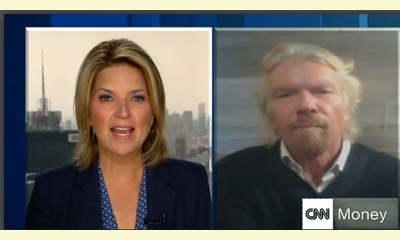|
|
Support Richard Branson’s Ukraine dialogue initiative
an article by Jan Oberg, Transnational Foundation for Peace and Future Research (TFF) (abridged)
Video: Branson, business leaders seek Ukraine solution
We are drifting towards a new Cold War. . . I am touched, therefore,
by Richard Branson’s initiative and its
motivation which I share: It is unbearable for those of us who
remember what the Cold War was about that ended in 1989 to think
of it coming back with striking similarities. 
Richard Branson on CNN Money
click on photo to enlarge
Undoubtedly business has a role to play in conflict resolution. When
in the right mode, business can contribute to peace and has much
much more to gain from peace than from war. It is one of the huge
myths of our time that military industry is good for the economy as
such. It is a cancer on it. It is only good for the companies that
produce and export weapons, the merchant’s of death. For the
merchants of life – about 95% of the world economy – military
production and warfare is a burden.
The West is going down economically. A major reason is that – like
the old Soviet Union – it is militarising itself to death and
simultaneously losing legitimacy and sympathy worldwide thanks to
one failed war after the other.
The problem Branson and his business mediators will have to deal
with is very well described in a new Foreign Policy article by John
Mearsheimer, How The
West Caused The Ukraine Crisis.
This conflict has many more parties than Russia and Ukraine: There
are conflicts inside Russia about this, there are strong divisions
inside Ukraine and its separatist factions in Eastern Ukraine, there is
the EU – also to some extent split on it – there is NATO and
Washington, the latter divided in sensible elites and neo-cons
reckless intriguing policies. And there is the US/Europe conflict
potential.
Mediating in this conflict is not an easy piece of cake. But I can see
how much more fruitful, human – perhaps even humourous – a
meeting between Branson and Putin would be compared with
anything Western politicians have done and said up till now.
Indeed, the world could use many more non-government mediators
– people with wisdom, high on intellect and low on violence – in
international conflicts such as the one in Ukraine – say, Hans von
Sponeck, Shirin Ebadi, Erkki Tuomioja, Kofi Annan, Jimmy Carter,
Michael Gorbachev, Kishore Mandhyan, Mary Robinson, Hans Küng –
to mention a few.
The Branson initiative looks close to impossible. But his and his
colleagues great advantage is that they have no weapons and can
issue no threats. And he certainly knows how to deal with human
beings.
Since there exists no new or innovative ideas in NATO/EU circles
about how to handle conflict or making peace anything else may
turn out to be better.
So let’s support Sir Richard in this. TFF will certainly do what it can.
|








|
DISCUSSION
Question(s) related to this article:
Where in the world can we find good leadership today?,
* * * * *
Latest reader comment:
Once again, as they have done now each year since 2009, the Nobel Women's Initiative provides biographies of 16 women leaders involved in local action for peace and justice around the world, and in particular to stop violence against women. Last year's biographies were listed in the CPNN discussionboard.

|
|









